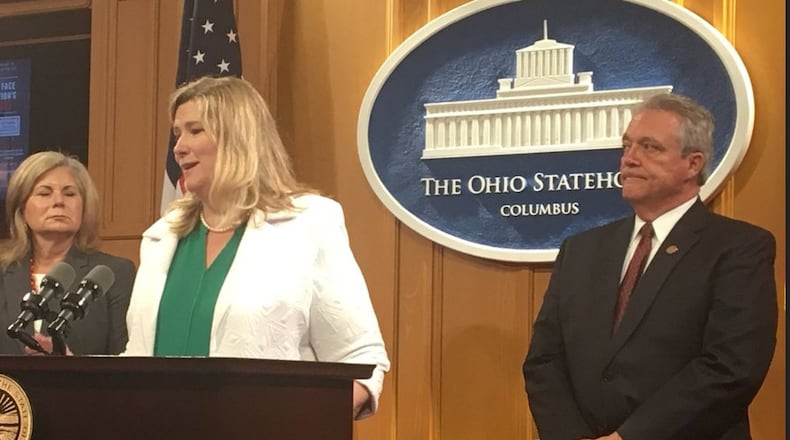“We need a unified and coordinated response and it needs to be in partnership with communities,” Whaley said.
Brown said he is looking for bipartisan support of the bill, but has not yet spoken with Republican leaders in the House and Senate. He said both candidates for governor — Democrat Richard Cordray and Republican Mike DeWine — have indicated interest in creating a drug policy office.
DeWine included the creation of a cabinet-level position in his 12-point “Recovery Ohio” plan released last October.
RELATED: AG DeWine outlines opioid initiative ideas
Whaley, along with Whitehall Mayor Kim Maggard and Groveport Councilwoman Jean Ann Hilbert, shared some of the innovative solutions their cities have done to decrease overdose deaths. Cities need a more efficient way to share those ideas and resources and avoid expensive duplication, Whaley said.
“We have found ways that could really be replicated in other communities,” she said, noting Dayton is preparing a 50-page report on what has worked locally to reduce drug overdose deaths significantly from mid-2017 to now.
“We need more than ad hoc piecemeal approaches,” Brown said.
The current Governor’s Cabinet Opiate Action Team was created by executive action from Governor John Kasich, Brown said, and therefore is temporary. His bill would create a permanent office to address the crisis now and into the future, he said.
How to get help: An opioid addiction resource guide
The Mayor’s Alliance recommendations include seven functions such an office could fulfill:
- Coordinate anti-drug efforts from across state and local governments.
- Act as a source of information on innovative new programs communities are adopting and better publishing best practices.
- Help to facilitate cooperation between local governments.
- Seek new sources of funds, through private and public means, for drug prevention and treatment.
- Review existing agency rules to remove barriers to treatment.
- Establish a telephone hotline for community leaders to be able to contact with questions and information.
- Require quarterly public reports of opioid addiction progress and challenges to the General Assembly.
- Require the Governor to appoint a Director of Drug Policy to oversee the new department
RELATED: New challenge for recovering addicts: Finding a job
Whaley and the others said cities have lost $2 billion in local funding from the state since 2011, leaving many to fight the opioid crisis on tight budgets. This bill wouldn’t add money back to local government fund, Whaley said, but cities could see cost saving through better coordination.
“What works in Dayton may or may not work in Columbus or Canal Winchester, but we frankly just don’t know without a strategic partnership from the state,” she said.
MORE FROM THE PATH FORWARD:
About the Author
